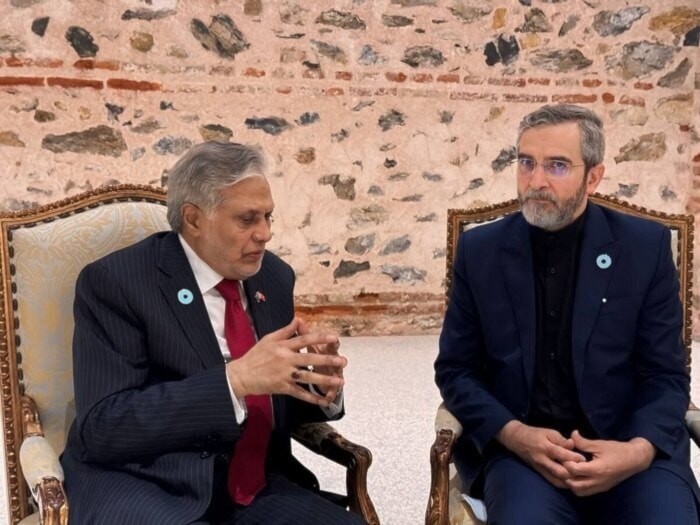Pakistan to use its UNSC membership in support of Iran: Pakistani FM
Pakistan's FM and Iran's acting FM have met on the sidelines of the OIC emergency session to discuss bilateral and West Asian matters.
-

Pakistani Foreign Minister, Mohammad Ishaq Dar, and Iran's Acting Foreign Minister Ali Bagheri Kani (Mehr)
Pakistan's foreign minister says his country will utilize its future United Nations Security Council (UNSC) membership to support Iran.
Mohammad Ishaq Dar, Pakistan's Deputy Prime Minister and Foreign Minister, met with Iran's Acting Foreign Minister, Ali Bagheri Kani, on the sidelines of the Organization of Islamic Cooperation (OIC) extraordinary meeting, to discuss bilateral issues and the latest developments in West Asia.
Bagheri Kani relayed Iran's appreciation of Pakistan's position from the Israeli violation of the nation's sovereignty and national security, referring to the assassination of martyred Hamas leader Ismail Haniyeh.
"Fortunately, we are witnessing the formation of a nationwide mobilization in the public opinion of the world, especially the Islamic world, in condemning the Zionists," Bagheri Kani said, adding that "Israel's" end-goal is to attack all Islamic countries, not only Palestine.
Pakistan's top diplomat then assured his Iranian counterpart that his country would exercise the full capacity of its UNSC membership to support Iran, adding that garnering support against the Israeli occupation could also be done during general assembly meetings.
Earlier, Ishaq Dar held separate meetings with his counterparts from Malaysia, Algeria, and the OIC Secretary-General.
Meanwhile, Bagheri Kani also met with the OIC Secretary-General. He stated that Iran expects Islamic countries to support its inherent and legitimate right to respond legally and appropriately to Zionist aggression.
He added that Iran's actions would not only defend its sovereignty and national security but also contribute to the stability and security of the entire region.
Iran vows to retaliate
Iran had called for an emergency OIC session after the Israeli assassination of Ismail Haniyeh in Tehran last week, following talks with several regional actors.
Bagheri Kani held discussions with foreign officials from Saudi Arabia, Egypt, and Turkey to address the latest Israeli escalation in the region. Meanwhile, huge Iranian crowds participated in the funeral procession of the martyred leader Ismail Haniyeh in Tehran.
In a phone call with Saudi Foreign Minister Faisal bin Farhan, Bagheri Kani emphasized that "the assassination of the martyr Haniyeh by the occupying entity is a violation of Iran's security" and "seriously threatens regional stability and security."
He reiterated to the Saudi foreign minister that "Iran will exercise its legitimate right to respond decisively to the Zionist entity, making it regret its actions forever."
Additionally, Bagheri Kani had a phone conversation with Egyptian Foreign Minister Sameh Shoukry, reiterating that "Iran will not abandon its natural right to respond."
The leader of the Islamic Revolution and Republic of Iran, Sayyed Ali Khamenei, affirmed, following the assassination of the head of Hamas' Political Bureau, martyr Ismail Haniyeh, that the Israeli occupation "brought upon itself the most severe punishment."
Sayyed Khamenei stressed that retribution for Haniyeh's blood is "Iran's duty because he was martyred on our soil," adding that Haniyeh's assassination, who was a guest in Iran, "also set the ground for [the enemy's] harsh punishment upon itself."

 3 Min Read
3 Min Read








